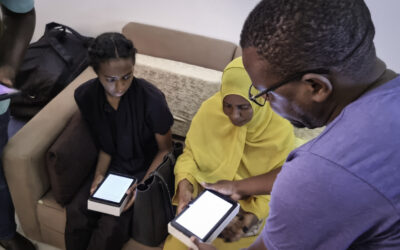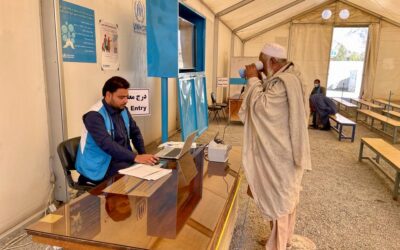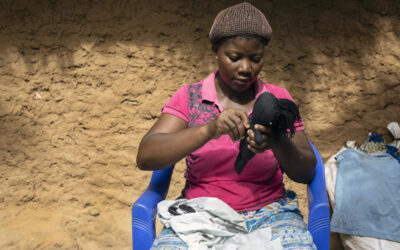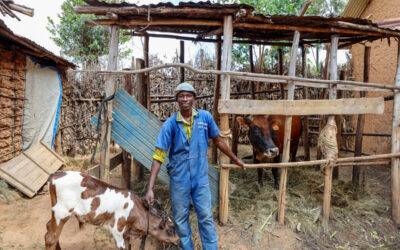Data Blog
Advancing the collection and use of data to inspire solutions for forced displacement

Improving solutions to forcible displacement through evidence: learning from impact evaluations in East Africa
Impact evaluations in East Africa are providing critical insights into what works—and what doesn’t—when supporting people affected by forced displacement. But there remains significant gaps in evidence.
The private sector increases work-based integration for Venezuelan refugees and migrants in Colombia
Effectively integrating refugees and migrants in labour markets boosts productivity, increases the availability of skilled workers, and drives economic growth.
The journey to build a new open data finder on forced displacement that includes thematic data: Part 1
In 2017, the United Nations Statistical Commission adopted an indicator framework of 231 unique indicators to monitor the progress towards the Sustainable Development Goals (SDGs). Similarly the World Bank tracks 1,400 indicators on development and UNICEF over 680 on women and children. But what about the visibility of refugees, stateless, and other people affected by forced displacement?
Inclusion of Forcibly Displaced and Stateless Persons in National Statistics
Forcibly displaced persons, including refugees and internally displaced people (IDPs), as well as stateless persons are frequently underrepresented or invisible in national data. However, realiable and nationally owned data is vital to guide effective national policies and decisions that foster the inclusion of forcibly displaced and stateless persons around the world. Statistical inclusion of forcibly displaced and stateless persons refers to the process of systematically including these groups in national data production systems such as population and housing censuses, administrative registers or nationwide household surveys.
Inclusion statistique des réfugiés et des rapatriés au Burundi : une approche localisée pour collecter des données de bonne qualité
Par Ilgi Bozdag et Felix Ndama Wa Ndama L’UNHCR a mené sa deuxième enquête de suivi des résultats au Burundi en 2023 avec les rapatrié.e.s près de la frontière tanzanienne, dans la commune de Muyinga. ©GNK/Diane Kaneza Le Burundi, pays...
Statistical Inclusion of Refugees and Refugee Returnees in Burundi: A Localized Approach to Collect Good Quality Data
The East African country of Burundi currently hosts 300,000 forcibly displaced and stateless people. This includes 85,000 refugees and asylum-seekers, 25,000 internally displaced persons, 800 people at risk of statelessness. At the same time, UNHCR repatriated over 185,000 Burundian refugee returnees since September 2017. The UN Refugee Agency’s involvement in the country focuses particularly on providing assistance and protection for these populations as well as promoting their inclusion in national systems, enhancing their self-sufficiency, and supporting durable solutions, such as integration or resettlement.
The Microdata Library in 2023: furthering the commitment to the responsible sharing of microdata
Razan and other volunteers train for data collection ahead of aid distributions. ; The conflict that erupted in April in Sudan has displaced millions of Sudanese. Many of them are sheltering in Wadi Halfa, hoping to be allowed to enter Egypt. © UNHCR/Mohamed Rached...
Using biometrics to support cash-based interventions for Afghan returnees
Forced displacement in Afghanistan is a multi-faceted situation within the country’s 40 years of protracted conflict. Furthermore, thousands of people are impacted by natural disasters, including earthquakes. This complex situation has led to an increased number of people becoming displaced both within the country and into neighboring countries. At end of November 2023, there are 7.7 million Afghans in Iran and Pakistan, including registered Afghan refugees and Afghans in refugee-like situations . At the same time, and despite the difficult situation, people still repatriate to their country of origin.
Refugees enjoy better integration when they and their hosts are more financially secure
An impact evaluation shows significant socioeconomic benefits among refugees and hosts who participated in a graduation programme in Mozambique.
Unlocking the economic gains of hosting refugees starts with economic inclusion
Supporting the economic resilience of refugees is a central piece of the global effort to meet the SDGs.
World Teachers’ Day 2023 – Addressing the Overlooked Plight of Refugee Teachers
By Rebecca Telford, Ed.D, Global Chief of Education, UN Refugee Agency (UNHCR) Deng Akuel Kuir, a 28 year old South Sudanese refugee teacher at Bahr El Naam Girls school in Kakuma in school with his students. He teaches class 7 and 8. He was born and raised in Kakuma...
About the blog
The UNHCR Data Blog brings attention to data and research on protecting the rights and wellbeing of people forced to flee. It is also a forum to discuss research innovations in data-scarce forced displacement settings.
Useful links
UNHCR Data Transformation Strategy 2020 – 2025
UNHCR Socioeconomic Data and Analysis
Guidance on Registration and Identity Management
Registration and Identity Management at UNHCR
Socioeconomic Assessment Toolkit
Orientation for the early stages of planning a socioeconomic survey
Guidance on sampling household level surveys from UNHCR proGres registration data










